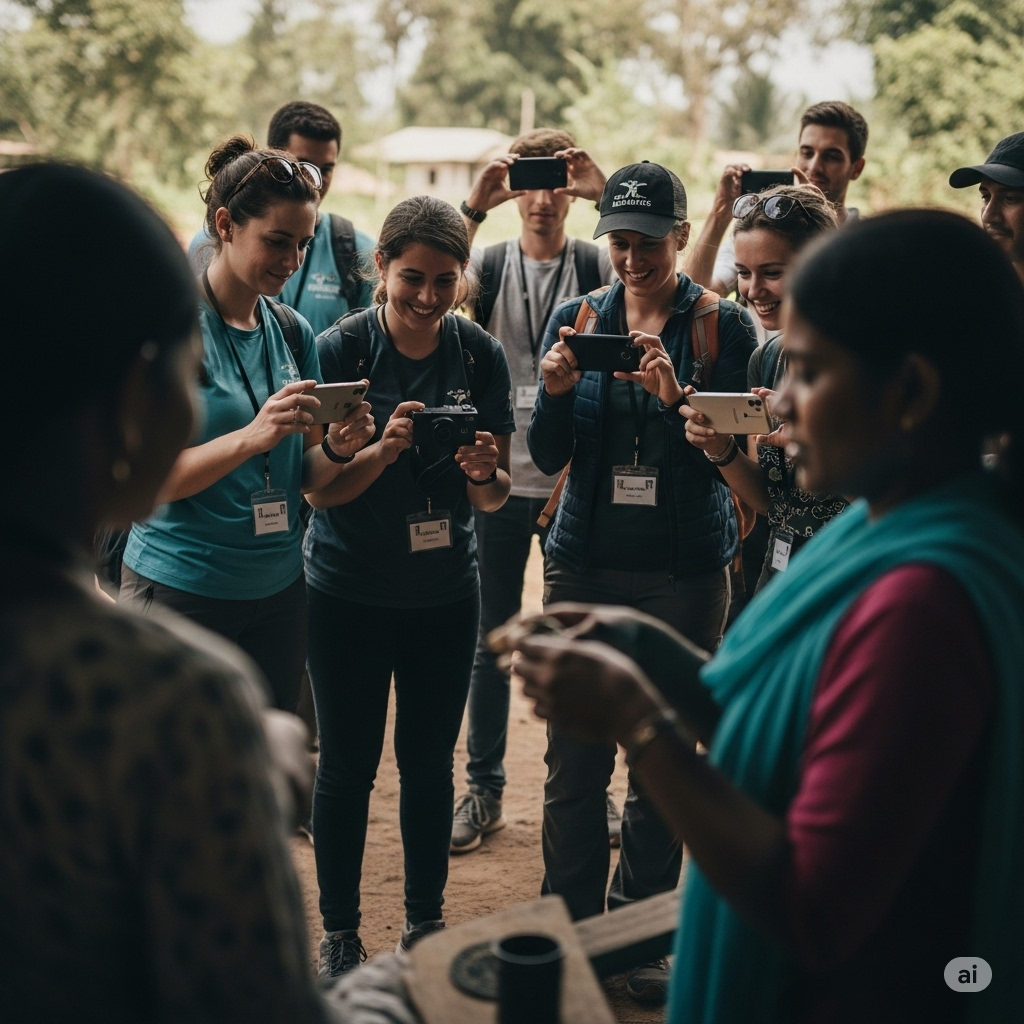Human Zoos of the 21st Century: The Dark Side of “Voluntourism”
Behind smiling selfies and feel-good Instagram posts lies a disturbing truth modern voluntourism often reduces vulnerable communities to backdrops for Western savior fantasies. Welcome to the human zoos of the 21st century, where exploitation wears the mask of charity.

Amidst an Instagram-obsessed world where people live for likes and their own personal brand, "voluntourism" is a lucrative business. Thousands of young tourists converge annually on developing countries to dig wells, paint schools, or snuggle orphaned babies sometimes for a fee. At first blush, it's a two-way win: locals are assisted, and tourists go home feeling fulfilled and with a phone full of images.
But beneath the glossy veneer lies a disturbing truth. Critics call it the modern-day human zoo a system where privileged outsiders briefly drop into impoverished communities, treat them as exotic backdrops, and disappear without leaving meaningful change.
This article exposes how voluntourism perpetuates dependency, fuels exploitation, and ultimately reduces entire cultures to props in a feel-good narrative.
The Rise of Voluntourism: From Mission Trips to Instagram Content
Volunteering overseas is not new. Missionary organizations and NGOs have been organizing aid workers to address natural disasters, health emergencies, and education deficits for decades. But around the early 2000s, another model had developed.
Commercial travel agencies saw they could package the experience of volunteering selling it as adventure, moral improvement, and résumé-broadening all in one. As social media blew up, the trend took off. As a 2019 Google Trends analysis found, search interest in "volunteer abroad programs" has increased more than twofold since 2005.
By 2017, voluntourism was a $2 billion sector, with tens of thousands of organizations selling "volunteer vacations" in more than 100 nations. Most of these programs are marketed to Westerners who can pay, who want to have meaningful experiences rather than contribute to sustainable development.
The Problem: When Good Intentions Backfire
Fundamentally, voluntourism turns poverty into a commodity. The encounter is no longer about impact but about individual fulfillment.
Here's how the cycle typically goes:
- Volunteer enrolls usually with minimal to no training.
- Company profits thousands of dollars in program fees.
- Short-term projects are designed to handle ongoing turnover.
- Communities become reliant on revolving doors of untrained volunteers.
- Photos pour onto social media, perpetuating stereotypes about the "grateful poor."
Essentially, voluntourism can reduce actual human beings to living exhibits a contemporary echo of 19th-century "human zoos," wherein colonized individuals were put on display in European capitals for general entertainment.
Case Study: The Orphanage Scandal
Perhaps the most disturbing area of voluntourism is orphanage tourism. In Nepal, Cambodia, and Uganda, among other destinations, the "orphan experience" has spawned a perverse incentive: orphan factories.
In a 2017 report by Save the Children, up to 80% of orphanage children around the world are not really orphans. They have one or both living parents but are hired or flat out bought by businesspeople who understand that a consistent flow of foreigners as volunteers generates consistent revenue.
In a blistering report stored on Archive.org, Australian author Kate van Doore outlined how voluntourism in orphanages generates child trafficking. "The volunteers believe they're doing something good," she wrote, "but the fact of going and giving creates demand for additional 'orphans.' It's a cycle of exploitation."
Why Short-Term Volunteering Does Not Work
Apart from orphanages, the short-term scope of voluntourism thwarts substantive development:
- Lack of Skills: The majority of volunteers are not trained. A Boston tourist is not likely to have the skills to install a rural Malawi sanitary water system.
- Disruption of Local Economies: Free labor drives out local workers. When a school is constructed by volunteers, construction workers who get paid lose employment.
- Cultural Insensitivity: Travellers tend to come without knowing customs, languages, or power structures of the place they visit, creating conflict and anger.
Development professionals have a term for this: "The White Savior Industrial Complex." It describes the impulse to save rather than to empower, to impose goodness rather than to work against structural inequality.
Human Zoos: Echoes of a Colonial Past
During the 19th and early 20th centuries, European powers organized "ethnographic expositions" that showcased colonized peoples as zoo exhibits. The 1889 Paris Exposition, for instance, built an entire "Negro Village" with 400 African men, women, and children staging daily life for gawking masses.
Though voluntourists don't carry things quite to that extreme, the underlying dynamic is hauntingly close:
Come and witness "authentic" life among the poor. Take pictures. Feel yourself moved. Go home.
Here, the home community becomes a show its struggles commodified. When volunteers share photos of themselves embracing poor children, they unwittingly perpetuate a myth that poverty happens for their own change.
The Social Media Effect
Instagram and other platforms have turbocharged voluntourism.
Photos labeled #voluntourism or #dogood are uplifting to see but they perpetuate a poisonous economy of performance. A 2022 review of more than 10,000 Instagram posts by The Guardian (accessed through Archive.org) found the most-shared posts shifted focus from community to volunteer. Locals make a background appearance nameless and voiceless.
Thus, social media not only records voluntourism. It insists on it: The more altruism you act out, the more you get validated.
Real Impact or Just Feel-Good Trips?
Some of its defenders just say that something is better than nothing. But evidence indicates that most voluntourism efforts do not succeed or even harm:
- A 2014 study published in the Journal of Sustainable Tourism reported that the vast majority of short-term programs in Nepal made no tangible differences after the volunteers had departed.
- The Cambodian Ministry of Social Affairs indicated that more than 70% of orphanages that were running in the country were not registered and did not meet minimum child welfare standards.
Even where the intentions are altruistic, a lack of accountability allows volunteers to leave behind communities to deal with the consequences.
What Ethical Alternatives Look Like
Not everything is exploitative volunteering abroad. Ethical programs have certain features in common:
- Locally Led: Projects are started and directed by the community itself.
- Skills-Based: Volunteers provide skills that local employees require and ask for.
- Sustainable: Projects have long-term budgets and do not rely on ongoing volunteer turnover.
- Cultural Humility: Volunteers are trained in cultural norms and power relations.
- No Orphanages: The UN has directly urged a stop to orphanage voluntourism as a cause of child trafficking.
If you're thinking about volunteering overseas, ask yourself:
- Who requested this project?
- Am I taking away from local workers?
- What will occur when I go away?
- Who gains the most from my visit me or the community?
What Needs to Change
- Tighter Regulation
Today, voluntourism exists in a regulatory gray area. Voluntourism companies are mostly for-profit organizations that claim to be charities. Governments require tougher licensing and disclosure requirements to hold them accountable.
- Cultural Competency Training
Prior to setting foot in another nation, volunteers must learn about colonial histories, power dynamics, and local traditions.
- Ending Orphanage Tourism
In accordance with UN and UNICEF suggestions, travelers and agencies must end all assistance for orphanage visits.
- Reframing Volunteering
Altruism shouldn't be a marketing strategy. It should be about listening, humility, and solidarity.
Conclusion: Rethinking the Narrative
The human zoo of the 21st century doesn't require an entrance fee or an upper European fairground. It exists on hashtags, on curated experiences, and the need to be a savior.
But genuine change involves more than a photo opportunity. It takes facing the uncomfortable reality: at times, the most effective way to assist is to step away, enable local leadership, and disassemble the systems that built inequality in the first place.
Sources
- CourtListener. Cambodian Ministry of Social Affairs Reports. courtlistener.com
- Justia. Orphanage Trafficking Case Documents. justia.com
- Archive.org. The Guardian: The Dark Side of Orphanage Volunteering. archive.org
- Google Trends. Search Interest in Volunteering Abroad. trends.google.com
- Save the Children. Orphanage Volunteering and Child Trafficking Reports. savethechildren.org
- The Guardian. Instagram Voluntourism Analysis. theguardian.com
- United Nations. Guidelines for the Alternative Care of Children. unicef.org
- Journal of Sustainable Tourism. Voluntourism Impact Studies. tandfonline.com
For more legal exposes and truth-behind-glamour stories, subscribe to AllegedlyNewsNetwork.com




